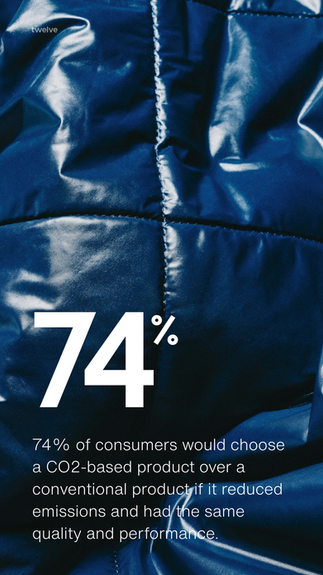Made from Air: Why Making Products from CO2 is the Next Big Thing for Brand Innovation
- Catalyst
- Jul 3, 2025
- 7 min read
Updated: Nov 4, 2025
Making products from CO2 instead of oil is a paradigm shift in manufacturing and a rare opportunity for brands to lead a new era of innovation where sustainability is a competitive advantage.

Today, almost all of our everyday products — from our running shoes and electronics to the detergent in our laundry rooms — are made from oil. That includes the raw materials in plastics, textiles, fuels, coatings, colorants, surfactants, and beyond. In other words: we don’t just burn fossil fuels for energy, we use them to make our material world.
For consumer brands trying to decarbonize, this is the core challenge: oil is the default building block of our material world.
While most sustainability efforts focus on reducing emissions from energy or transportation, 96% of all manufactured goods rely on chemical processes, and over 95% of the feedstocks used in those processes are derived from fossil fuels like oil, natural gas, and coal. Polyester, nylon, EVA, TPU, polycarbonate, rayon, and acrylics—all common in fashion, footwear, and consumer goods—are petrochemical materials made almost entirely from oil. Synthetic fibers now account for more than 60% of total global fiber production, with polyester alone reaching over 60 million metric tons annually. Oil isn’t just in the packaging. It’s in our clothes, our car seats, our couches—embedded in nearly every material we rely on.
For consumer brands trying to decarbonize, this is the core challenge: oil is the default building block of our material world.
Why Brands Struggle to Ditch Fossil Fuels
Most major brands have taken steps toward sustainability: switching to renewable energy, optimizing logistics, innovating packaging. But switching to more sustainable raw materials and tackling Scope 3 emissions is notoriously difficult, due in large part because of how intractable fossil fuels are across the supply chain in the form of petrochemicals, materials and ingredients (in addition to use for fuel and energy). The production and use of petroleum-based materials has been optimized for decades—they’re reliable, durable, and cost-effective. Alternatives often fall short in scalability, quality, or performance.
Take a well known toy brand that makes plastic building blocks: they spent years trying to replace its petroleum-based ABS plastic in their iconic bricks with a sustainable alternative. In 2021, they unveiled a prototype brick made from recycled PET. But by 2023, they had to abandon the initiative—not due to lack of commitment, but because the material couldn’t meet the brand's high standards for strength and durability.
Enter CO2Made®: A Platform for What’s Next
Twelve was born from a radical question: What if we could replace fossil fuels at the molecular level without compromising performance?
That question led us to develop our carbon transformation technology that converts captured CO2 and water into the chemical building blocks for fuels and materials through a process powered by 100% renewable energy.
We call the outputs CO2Made® products: fossil-free, drop-in replacements for petrochemicals that can be used in everything from apparel and personal care products to electronics and furniture.
How It Works: Turning CO2 into Products
Twelve's carbon transformation technology works like industrial photosynthesis, converting CO2 and green hydrogen (sourced from water) into chemical building blocks through a process fossil-free and emissions-free process powered by renewable energy.
Here's how it works:
CO2 Capture
We use CO2 either captured directly from the air (Direct Air Capture) or from industrial emissions at the source — turning waste carbon into a feedstock.
Electrochemical Conversion
Using only renewable electricity, water, and proprietary metal catalysts, we split CO2 molecules and rearrange their carbon atoms through electrochemical reduction—a clean, electrified alternative to fossil refining.
Molecular Reassembly
The CO2 becomes key chemical building blocks like carbon monoxide, syngas, and ethylene — which are used to manufacture plastics, foams, fuels, and more.
Mass Production via AirPlant™
Our distributed production system, AirPlant, enables decentralized manufacturing of CO2-based materials anywhere CO2, water, and electricity are available—enhancing resiliency and geographic flexibility.
Unlike carbon offsetting or storage, Twelve transforms CO2 into the exact same molecules that would otherwise come from oil—without the fossil inputs or associated emissions. This leads to a direct reduction in a brand’s supply chain emissions, and an innovative product story that they can proudly communicate to customers.
Unlike carbon offsetting or storage, Twelve transforms CO2 into the exact same molecules that would otherwise come from oil—without the fossil inputs or associated emissions. This leads to a direct reduction in a brand’s supply chain emissions, and an innovative product story that they can proudly communicate to customers.
From Oil to Air: Replacing Petrochemicals with Electrochemicals
The real revolution lies in the invisible ingredients—the flexible foams, durable plastics, and synthetic fibers that form the backbone of consumer goods. These are the hard-to-replace, oil-heavy materials inside our shoes, our cars, and our homes. CO2Made means we can manufacture identical materials—EVA, polyester, TPU— from CO2 instead of fossil fuels. Same performance. No fossil fuels. No Emissions. No compromise.
Simply put: We can swap oil-based ingredients and materials for ingredients and materials made from air.
Simply put: We can swap oil-based ingredients and materials for CO2Made materials made from air. CO2Made products aren’t theoretical. Twelve has already partnered with global brands like Procter & Gamble and Mercedes-Benz to make CO2Made products:
Mercedes-Benz
Interior auto parts made from CO2-based polymers.
Procter & Gamble
CO2-based ingredients for Tide laundry detergent.
Pangaia
Sunglass lenses made from CO2.

Why CO2-Based Products Matter Now
As consumer demand for sustainable products grows and brands face mounting pressure to meet net zero commitments, CO2-based products offer a powerful path forward. They don’t just align with climate goals—they help future-proof supply chains, unlock innovation, and position brands as leaders in the transition to a cleaner industrial system.
CO2-based products offer a powerful path forward. They don’t just align with climate goals—they help future-proof supply chains, unlock innovation, and position brands as leaders in the transition to a cleaner industrial system.
CO2Made products enable a new kind of manufacturing built for impact:
Carbon-Negative, Fossil-Free
Eliminates fossil carbon at the source; the carbon from CO2 is stored in the CO2Made material for the life of the product.
Made from Abundant Feedstock
CO2 is everywhere, a liability we can turn into a feedstock.
Resilient Supply Chains
Modular, distributed production reduces dependence on volatile global oil distribution and refining.
Scope 3 Emissions Reduction
Enables upstream decarbonization, directly in materials.
No Trade-Offs
Drop-in replacements require no reformulation.
Global Scalability
Made anywhere there’s CO2, water, and renewable power.
It’s not just cleaner—it’s smarter. By using CO2 as a feedstock instead of petroleum, brands can cut fossil fuels and their emissions from products and supply chains, while also diversifying chemical and fuel production to build more resilient, future-proof manufacturing systems.
And, consumers want it.
Consumers Are Already Ahead of the Market
We conducted a national survey of 1,000 U.S. adult consumers to understand how consumers view CO2-based products. The results were clear:
74% would choose a CO2-based product
Results showed that 74% of consumers would choose a CO2-based product over a conventional one if it reduced emissions and maintained quality. Another 19% said they were open to CO2-based products, but needed more information—meaning 93% of consumers would consider CO2-based products over conventional petroleum-based.
74% of consumers would choose a CO2-based product over a conventional one if it reduced emissions and maintained quality. 76% would view a brand more positively for offering CO2-based products.
76% would view a brand more positively for offering products made from CO2
Additionally, 76% of consumers would view any brand more positively if they offered CO2-based products, with 78% saying they would view their favorite brands more positively.
64% are likely to recommend CO2-based products
CO2-based products would drive word of mouth: 64% of consumers would recommend them to others after learning about them.
56% of consumers are willing to pay more for CO2-based products
Over half would be willing to pay more for a CO2-based product, most would pay up to 10% more with many open to a 25% premium.
Labels matter: 72% more likely to buy CO2-based products if clearly labeled
Clear labeling is key: 72% of consumers would be more likely to buy a CO2-based product if it were clearly labeled and identifiable.
The top categories consumers want to see made from CO2 are: 1) Apparel, Accessories and Footwear (67%), 2) Technology and Personal Electronics (57%) and Beauty and Personal Care (53%).
It's a paradigm shift in how we make things that reflects a broader vibe shift in culture.
These insights reveal a rare opportunity for brands to lead a new era of innovation—where sustainability is a competitive advantage and products are made from air, not oil. It's a paradigm shift in how we make things that reflects a broader vibe shift in culture.
Chemistry x Culture: How Twelve Partners with Brands
Twelve created the CO2Made® Lab to help brands switch from oil to air: from a petroleum-dependent supply chain to a fossil-free one that harnesses CO2 as the feedstock for materials, ingredients and fuels . Here's how we collaborate:
Scope ID
Opportunity ID Roadmap: We begin by identifying where petrochemical inputs can be replaced across your supply chain, and map a strategic path to integrate CO2Made materials.
Hero Product
Together, we develop a hero product that exemplifies your brand’s commitment. This is supported by a commercial offtake agreement that secures reliable supply of scoped CO2Made materials in your supply chain.
Scale Carbon Transformation: CO2Made Products & eFuels for Transportation
Brands expand their CO2Made subscription across broader applications in their supply chain, accessing feedstocks and fuels from AirPlant™, our CO2-based production system to enable transformation from products to logistics to packaging.
At Twelve we believe in the power of storytelling to move markets and shift culture. Our partnership with brands in the CO2Made® Lab reflects this ambition.
At Twelve we believe in the power of storytelling to move markets and shift culture. Our partnership with brands in the CO2Made Project reflects this ambition: In addition to developing CO2Made products together, we work our brand partners to promote this innovation through education and storytelling.
From Petro to Possible: Now is the Time for Brand Leadership
We’re on the edge of a material revolution. One where everyday goods — from shampoo to car seats, from fashion to fuel — can be produced from CO2, not oil.
CO2Made is a platform for:
Renewable and Recycled Feedstock Objectives
Scope 3 Advantage
Brand Innovation
Market Leadership
Making products from CO2 instead of oil is a paradigm shift in manufacturing, and a strategic inflection point for brands. It’s an opportunity to lead the next era of innovation and advance a new climate culture—a world made from air.
Download The Power of CO2Made® Consumer Insights Report
Today, thousands of everyday consumer products are made from oil. Now, we can produce these same products from CO2 instead. To understand demand for this shift, we surveyed U.S consumers: 74% would choose CO2-based products over conventional petroleum-based products, and 76% would view brands more positively for offering them. These insights reveal a rare opportunity for brands to lead a new era of innovation where sustainability is a competitive advantage. Download the full report below.
Want to explore CO2Made® Products for your brand?
Let’s build what’s next — from air.





























